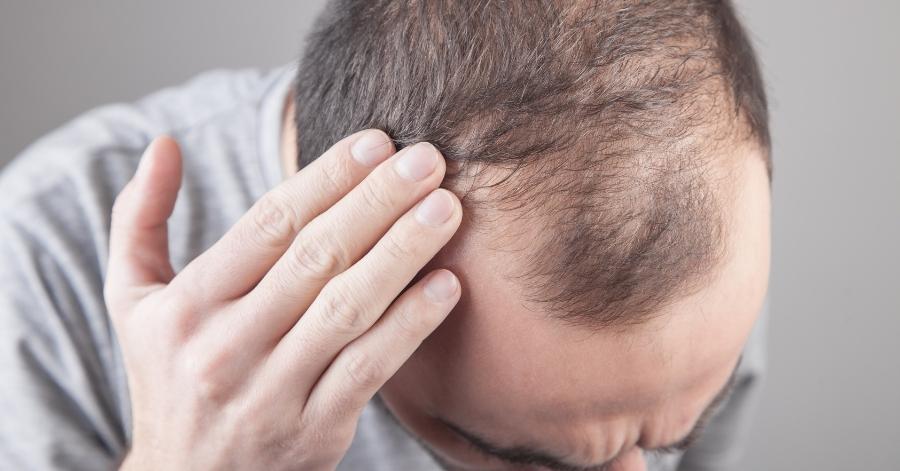To an extent, hair shedding is normal; however, increased hair fall can be alarming and even lead to hair loss. Discover the causes of hair fall in women and men alike, so you can take the necessary steps to prevent hair loss and baldness in time.
Hair fall, often known as hair loss, is a typical problem for many people. It can be caused by a number of circumstances, and preventative techniques vary depending on the root cause. In this blog, we will look at the five most common reasons for hair loss and how to prevent or treat them.
Quick facts about hair loss
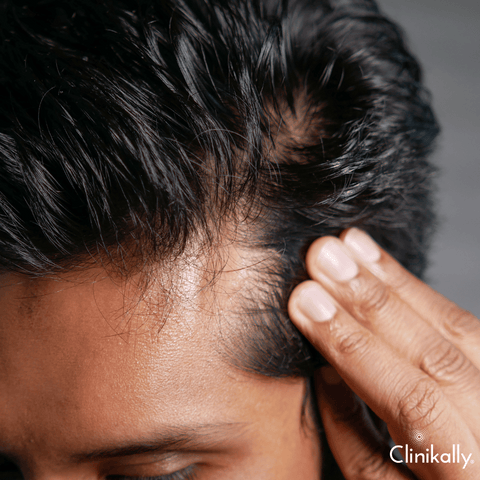
-
Contrary to popular belief, baldness is not caused by hair fall but by hair thinning which replaces normal hair.
-
Over 50 % of men show male pattern hair loss by the time they hit middle-age years.
-
By the time they reach menopause, close to 40% of women begin witnessing female pattern hair.
-
Heredity tends to be one of the most common causes of hair fall, and is referred to as “androgenetic alopecia”.
-
Thyroid imbalance and iron deficiency are prominent causes of hair fall in young adults that can be treated with effective dermatology.
-
The hormone resulting in male pattern baldness is Dihydrotestosterone, as it causes increased hair fall in men as compared to women.
-
Menstruation, pregnancy, and other natural changes in the body are some of the primary causes of excessive hair loss in women, which can be addressed with doctor-recommended hair loss treatment.
5 major causes of hair fall in India
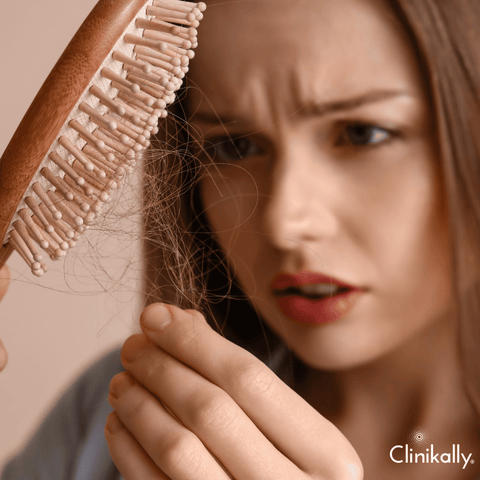
Persistent hair fall issues can cause sleepless nights for many men and women. Great hairs tend to enhance your overall personality, while significant hair loss can also be a disadvantage at times.
#1 Washing your hair with hot/hard water
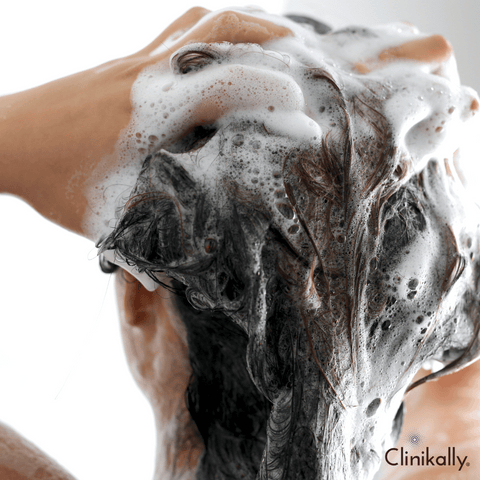
Excessive amounts of calcium and magnesium are found in hard water, making it difficult for you to wash your hair properly. Forming a salt after mixing with your shampoo, these impurities make your scalp dry and flaky, and it further leads to damaged hair strands that break off easily.
How to treat: Opt for an effective lemon rinse immediately after your shampoo to eliminate all the buildup on your scalp. Moreover, using dermatologist-recommended anti-hair fall shampoos will help you prevent hair damage caused by hot water.
Washing your hair with hot or harsh water can damage your hair and scalp. Here's what you should know:
Hot Water:
-
Dryness: Hot water can take natural oils from your hair and scalp, leaving it dry and prone to breakage. It can also cause itchy, dry skin on the scalp.
-
Color Fading: If you have colored hair, hot water can cause the color to fade faster because it opens the hair cuticles, enabling the color molecules to escape.
-
Weakened Hair: Heat can weaken the hair shaft, making it more prone to damage and breaking.
-
Scalp Irritation: Hot water can irritate the scalp, causing dandruff or worsening existing scalp problems.
Hard Water:
-
Mineral Buildup: Minerals such as calcium and magnesium are abundant in hard water. When you wash your hair with hard water, minerals can accumulate on your scalp and hair, producing a residue that makes your hair feel less clean and appear dull.
-
Dryness and Frizz: Hard water can strip your hair of its natural oils, resulting in dryness, frizz, and a lack of shine.
-
Difficulty Lathering Shampoo: Hard water makes lathering shampoo and soap more difficult, requiring you to use more products.
-
Scalp Irritation: Hard water mineral buildup can cause scalp irritation, itching, and dandruff.
#2 Taking certain pills or medicines

Many therapeutic drugs can cause severe hair fall in both men and women. If you take strong medications for high blood pressure, cancer, birth control, weight loss or anti-depressants, there are possible chances of experiencing increased hair loss.
These drugs alter your bodily functions and interfere with vital hormones. While some pills make your strands thinner, others may halt the growth altogether. Since hair loss begins with the consumption of these medicines, the effect can be reversed when you stop taking the pills.
How to treat: Consult with your doctor to find out the possible side effects of the medication. In some cases, like cancer, you may also go ahead with special therapies that will help prevent hair fall.
Here are some examples of how medications can affect your hair:
-
Hair Loss (Alopecia): Some drugs have been linked to hair loss as a negative effect. This is known as drug-induced alopecia. Chemotherapy treatments, blood thinners, and medications for high blood pressure, acne, and depression are common examples.
-
Dryness and Brittleness: Some medications can cause dry, brittle hair, making it more prone to breakage and damage. Variations in the body's water levels are frequently responsible for these consequences.
-
Changes in Hair Texture: Some medications can cause your hair to become finer or coarser in texture. These modifications can be either temporary or permanent.
-
Hair Growth: Certain medications can encourage hair growth, especially in cases of androgenetic alopecia, a medical condition. Minoxidil and finasteride, for example, are medications used to treat hair loss and promote hair growth.
-
Healthier Scalp: Medications that treat underlying scalp conditions like dandruff or psoriasis can result in a healthier scalp, which promotes better hair growth.
-
Improved Overall Health: Medications that address underlying health issues can benefit your hair indirectly by improving your overall health. Thyroid disorders, for example, can aid in the maintenance of healthy hair growth.
It's essential to keep in mind that the effects of medicine on your hair can differ from person to person. If you are concerned about how a specific medicine is affecting your hair, you must share your concerns with your healthcare provider. They can advise on how to control or lessen any unwanted effects and, if available, may suggest alternative treatment alternatives.
#3 Nutritional or vitamin deficiency
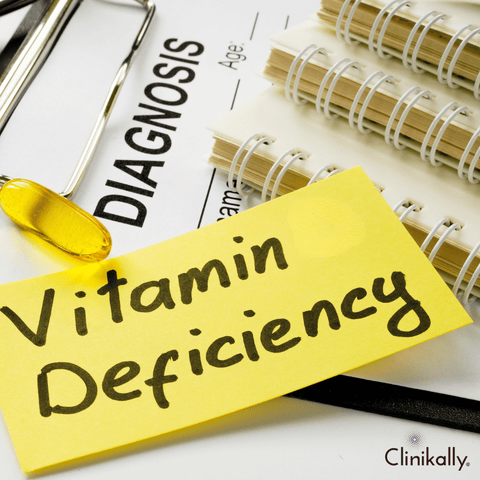
Vitamin and nutritional deficits can have a substantial impact on the health and appearance of your hair. Here's how vitamin shortages can damage your hair and how to avoid or treat them:
-
Biotin Deficiency: Biotin, often known as vitamin H, is essential for hair development. Hair loss, thinning, and brittleness can result from a deficiency. Eat biotin-rich foods such as eggs, almonds, and seeds. In severe cases, biotin supplements may be advised; however, visit your doctor first.
-
Iron Deficiency: Anaemia caused by iron shortage might result in hair loss. Hair might thin out, become dull, and break easily. Iron-rich foods such as red meat, chicken, beans, and spinach should be consumed. A healthcare physician may prescribe iron supplements if necessary.
-
Zinc Deficiency: A zinc deficiency can result in hair loss, scalp dryness, and flakiness. Consume zinc-rich foods such as oysters, almonds, and whole grains. In cases of deficiency, a healthcare physician may offer zinc supplements.
-
Vitamin D Deficiency: Vitamin D is required for the cycling of hair follicles. A deficit can cause hair thinning and loss. Get plenty of sun and eat vitamin D-rich foods such as fatty fish, fortified dairy products, and eggs. If you are deficient in vitamin D, supplements may be prescribed.
-
Vitamin A Excess: Excessive vitamin A use might result in hair loss. It is critical to keep a good balance of this vitamin in your diet. Avoid taking too much vitamin A and instead eat foods high in vitamin A, such as carrots, sweet potatoes, and dark leafy greens.
-
Protein Deficiency: Protein is a component of hair. Hair that is deficient in protein can become fragile, brittle, and prone to breaking. Make sure your diet contains enough protein from sources such as lean meat, fish, eggs, and plant-based options such as beans and tofu.
-
Omega-3 Fatty Acid Deficiency: Omega-3 fatty acids promote scalp and hair health. A deficiency can cause dry, lifeless hair as well as increased hair loss. Include omega-3-rich items in your diet, such as fatty fish, flaxseeds, and walnuts. Under the supervision of a healthcare expert, omega-3 supplements may be considered.
#4 Dandruff in your scalp and hair
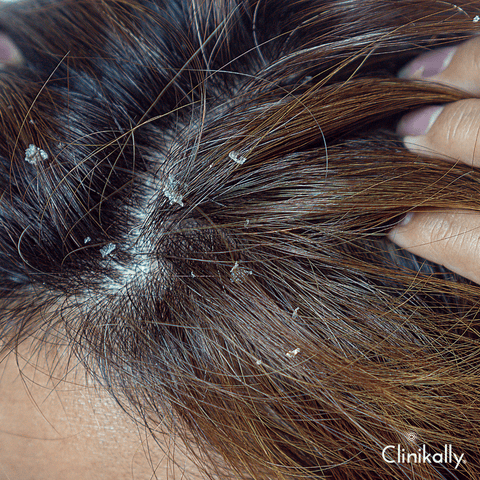
Increased dandruff can drive away all the moisture from your hair and scalp, leaving it completely dry. This causes excessive itching over the area, nudging you to scratch your head all the time. Because of the inflammation and damaged hair follicles, the strands lose their strength and fall off.
Various factors can lead to increased dandruff, including high stress, poor diet, and hair products containing severe chemicals. All these causes of hair fall can lead to hair thinning or even stop hair growth.
How to treat: To keep your hair moisturised, make sure to oil your hair regularly. This allows the pores to absorb nutrients, keeping your scalp dandruff-free. You can also use doctor-recommended hair products for dandruff to reduce dandruff and hair fall caused by dandruff.
Here's all you need to know about scalp and hair dandruff:
-
Seborrheic Dermatitis: This is among the most typical dandruff causes. It is a scalp condition characterised by red, greasy, and scaly patches. Seborrheic dermatitis is caused by an overgrowth of the yeast Malassezia, which causes dandruff.
-
Dry Scalp Skin: Dry scalp skin can cause flaking and dandruff. Cold weather and using too much hot water when washing your hair can aggravate this condition.
-
Not Cleaning Your Scalp: Inadequate shampooing and cleansing of the scalp can result in the accumulation of dead skin cells, oil, and hair care products, which can contribute to dandruff.
-
Hair Product Sensitivity: Some people are sensitive to the ingredients in their hair care products, such as shampoos and conditioners, which can cause dandruff-like symptoms.
Keep in mind that dandruff is usually treatable with the right products and scalp care. If you are unsure about the cause of your dandruff or if it persists despite home care, see a doctor for a thorough evaluation and advice on how to manage your specific condition.
#5 Using hair care products unsuitable for your scalp
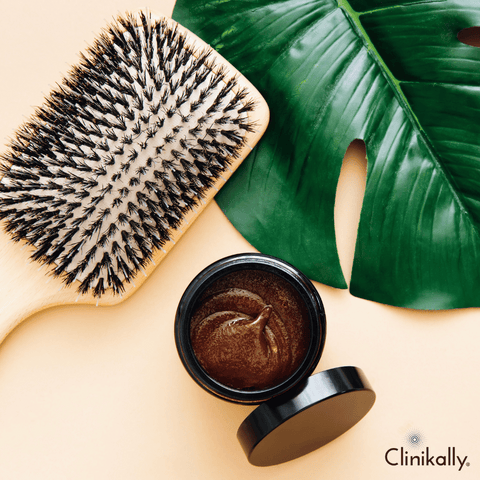
Hair fall can be your next enemy if you use hair care products without paying attention to their ingredients. Knowing your skin type and what suits your skin is essential to choosing daily products. Some harsh chemicals present in the not-so-reputed products can damage your hair beyond repair. They can also weaken your hair stands from the roots, increasing your hair fall drastically. On other occasions, such unsuitable products can also slow the regrowth of healthy hair.
How to treat: Using a shampoo or conditioner suitable for your scalp is the best solution to deal with the challenge. Choose dermatologist-recommended hair products that are safe for your hair.
Consequences of using inappropriate hair care products:
-
Excessively Oily or Dry Scalp: Using the wrong products can upset the natural oil balance on your scalp. Unsuitable products can strip the scalp of its natural oils, causing dryness, flakiness, and irritation. Some products, on the other hand, can make the scalp excessively oily.
-
Dandruff and Scalp Conditions: Products containing harsh chemicals or allergens can aggravate scalp conditions such as dandruff, seborrheic dermatitis, or psoriasis. They are capable of causing itching, redness, and flaking.
-
Hair Damage: Products containing harsh detergents or chemicals can weaken the hair shaft, making it more susceptible to damage, breakage, and split ends.
-
Allergic Reactions: Some people are sensitive or allergic to specific ingredients in hair care products, which can cause scalp irritation, redness, or even hives.
-
Loss of Volume and Shine: Using products that are not appropriate for your hair type can result in flat, lifeless hair with little shine. Hair can become limp or weighed down.
Using appropriate hair care products is critical for maintaining a healthy scalp and beautiful, manageable hair. You can promote hair health and achieve the desired results without risking damage or irritation by understanding your hair and scalp type and selecting products designed to address your specific needs.
Easy tips to reduce hair fall at home
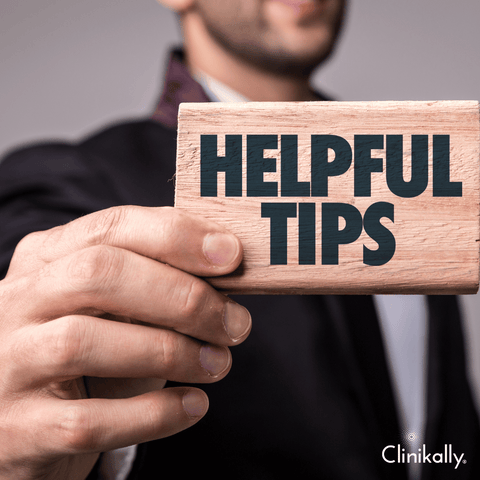
If you act fast and correctly, then some doctor-recommended home remedies for hair fall can help you prevent hair loss in women and men alike.
-
Aloe vera gel can strengthen your hair roots and hair follicles. Massage gently into the scalp using your fingertips to make your hair stronger and less prone to breakage.
-
Onion juice has antibacterial properties which help to fight scalp infections and scalp irritation. For faster results, you can massage onion juice into your scalp 2 to 3 times per week.
-
Egg hair masks are an effective way to boost hair growth. Mix egg yolk in a bowl and apply it to your scalp. Leave it for about 20 minutes before washing it thoroughly.
-
Green tea is exceptional in enhancing your immunity and strengthening the skin and scalp. Drink the infused team twice a day and see the difference in your hair
-
Coconut oil is an age-old home remedy for hair fall that also nourishes the hair and fights dryness. For best results, massage coconut oil into the scalp regularly.
Reduce hair fall with science-backed hair care!
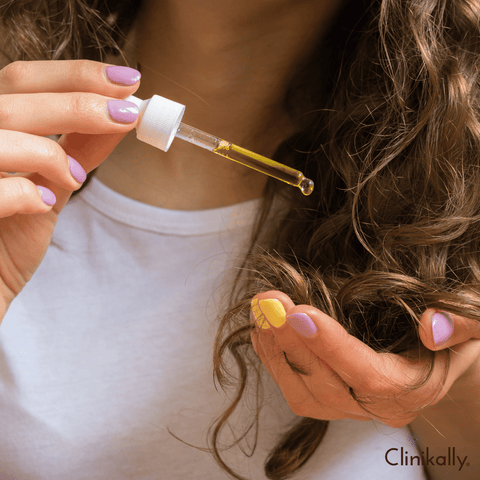
Gone are the days when you could not identify the causes of hair fall. With science-backed remedies and virtual platforms, one can easily get to the root of the issue and find a permanent solution. Hair care products on Clinikally along with a healthy hair care routine, can help prevent hair loss in women, men, and even the elderly.
With the above points in mind, it's easy to overcome the causes of hair fall in monsoon and all other times of the year. However, it is always better to consult with an expert to get the best and most dedicated solution. After all, all skin types are unique and demand individual attention!
Here are some science-backed tips and practises to help you deal with hair loss:
-
Use a Suitable Shampoo: Choose a shampoo that is gentle and devoid of sulphates for your hair type. According to research, sulfate-free shampoos help lessen scalp irritation and hair loss.
-
Scalp Massage: Massaging the scalp promotes hair development by increasing blood flow to the hair follicles. Regular scalp massage has been found in studies to improve hair thickness and minimise hair loss.
-
Hair Growth Promoting Ingredients: Look for hair care products that contain minoxidil, ketoconazole, caffeine, and biotin. These compounds have been shown to promote hair development and reduce hair fall.
-
Nutritional Support: Make sure your diet is high in vitamins (A, C, D, E), minerals (iron and zinc), and protein. These nutrients are essential for the health and growth of your hair.
-
DHT Blockers: Dihydrotestosterone (DHT) is a hormone that has been linked to hair loss. Some products, such as finasteride, contain DHT blockers, which can help prevent hair loss in people with androgenetic alopecia (male or female pattern baldness).
-
Laser Therapy: Devices that use low-level laser treatment (LLLT) have shown potential in encouraging hair growth and minimising hair loss. These devices emit low-level laser light that can stimulate hair follicle activity.
-
Microneedling: Microneedling of the scalp has been studied for its ability to stimulate hair growth and prevent hair loss, usually in conjunction with the use of hair development serums.
-
Professional Evaluation: Consult a dermatologist or healthcare expert if hair loss persists or worsens. They can do a complete examination, including blood testing, to rule out any underlying medical issues that are causing hair loss.
-
Prescription Medications: Some prescription drugs, such as minoxidil and finasteride, have been clinically demonstrated to reduce hair loss and promote hair growth. These should only be used under the supervision of a healthcare provider.
-
Stay away from harsh hair treatments: Excessive heat styling, harsh chemical treatments, and tight hairstyles can all cause hair damage and loss.
-
Stress Management: Chronic stress can aggravate hair loss. Stress-reduction techniques such as yoga, meditation, and mindfulness can help to support hair health.
-
Hydration and a Healthy Lifestyle: Stay hydrated, live a balanced lifestyle, and get regular exercise to improve overall health, which can help with hair growth.
Keep in mind that individual responses to various treatments may vary, and the effectiveness of a specific approach may be dependent on the underlying cause of your hair loss. Based on your specific needs and condition, a healthcare provider or dermatologist can provide personalised advice and recommendations.
The connection between stress and hair loss
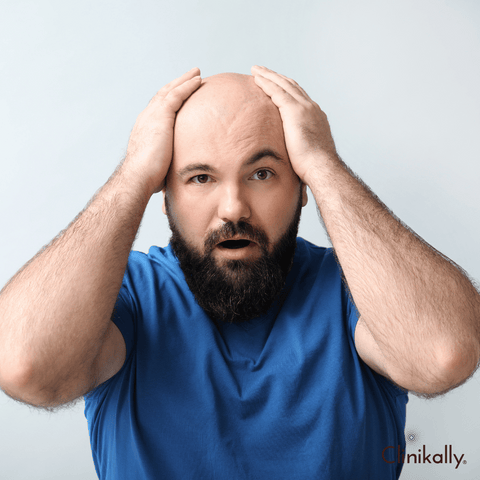
There is a well-known link between stress and hair loss. Understanding the link between stress and various types of hair loss is critical for managing and avoiding stress-induced hair loss. The following are the key links between stress and hair loss:
The Role of Stress in Hair Loss:
-
Chronic stress can cause an increase in the production of stress hormones such as cortisol. Elevated cortisol levels can disrupt the normal hair growth cycle, resulting in hair loss.
-
Stress can cause blood vessels to constrict, reducing blood flow to the scalp. This reduced blood supply can have an impact on the health and function of the hair follicles.
-
Stress can weaken the immune system, potentially increasing the risk of autoimmune-related hair loss like alopecia areata.
It is important to note that the relationship between stress and hair loss is complicated and varies from person to person. If you are experiencing stress-related hair loss, see a healthcare provider or dermatologist for an accurate diagnosis and advice on the best management strategies for your specific situation.
The science behind stress-induced hair fall
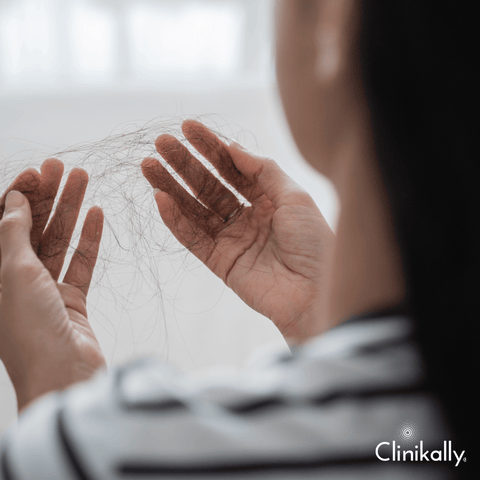
The science behind stress-induced hair loss, particularly in the context of a condition known as telogen effluvium, includes the impact of chronic stress on the hair development cycle as well as the body's hormonal and immunological responses.
Stress-Related Mechanisms:
-
Chronic stress causes the body to go through a series of physiological responses, including the release of stress hormones like cortisol and the activation of the sympathetic nervous system (fight-or-flight response).
-
Hair Follicle Miniaturisation, Hair Follicle Cycling, and Inflammation can all be caused by elevated cortisol levels.
-
Changes in hormone levels caused by stress, such as Altered Hormones and Androgen Receptors, can have an effect on the hair growth cycle.
-
Stress can impair the immune system. In some situations, immune system dysfunction causes the body to attack its own hair follicles, causing autoimmune-related hair loss diseases such as alopecia areata.
It is important to remember that the precise causes of stress-induced hair loss can be complex and differ from person to person. If you feel that stress is causing your hair loss, see a healthcare practitioner or dermatologist for an accurate diagnosis and personalised advice on the best management options for your unique condition.
Mindfulness practises to combat stress-related hair loss

Mindfulness practises can help you manage and lessen the impact of chronic stress on your body and general well-being, which can help you prevent stress-related hair loss. Here are some mindfulness methods that can help:
-
Meditation: Regular meditation practise can help reduce stress and promote relaxation. To stay in the present moment, try mindfulness meditation, which involves focusing on your breath, thoughts, or a specific mantra.
-
Deep Breathing Exercises: Deep breathing techniques, such as diaphragmatic breathing or the 4-7-8 technique, can calm the body's stress response and lower cortisol levels.
-
Yoga: Yoga incorporates breathing exercises, physical postures, and meditation. It can increase relaxation, lessen stress, and increase flexibility.
-
Progressive Muscle Relaxation: To relieve physical tension and lower stress, this technique alternates between tensing and relaxing various muscle groups.
-
Eating with awareness: Consider the food you consume and the feelings it evokes in you. A balanced diet can promote good health in general, which includes healthy hair.
-
Journaling: You can examine your ideas and feelings and discover stressors by keeping a journal. This self-reflection can lead to improved stress management.
-
Guided Imagery: Guided imagery sessions encourage you to visualise peaceful and calming scenes, which can aid in stress reduction and relaxation.
-
Mindful Walking: Make time to go for mindful walks in nature. Take note of the sights, sounds, and sensations that surround you. Being in nature can be very relaxing.
-
Body Scan: A body scan entails mentally "scanning" your entire body from head to toe, focusing on any areas of tension and consciously relaxing them.
-
Gratitude Practise: Focusing on the positive aspects of your life can help you shift your perspective and reduce stress.
-
Mindful Time Management: Use time management techniques to alleviate feelings of being overwhelmed. Setting realistic priorities and boundaries can aid in stress reduction.
-
Digital Detox: Limit screen time and exposure to stressful news or social media. Establish tech-free zones in your everyday schedule.
Combining mindfulness practises with other stress-management approaches, such as regular exercise, proper sleep, and a well-balanced diet, can aid in the prevention of stress-related hair loss and increase overall well-being. Remember that everyone's response to mindfulness practises will differ, so it's critical to find the strategies that work best for you and incorporate them into your daily routine.
Dietary impact on hair health

Diet is an important factor in maintaining good hair. A healthy, well-balanced diet can encourage hair development, minimise hair loss, and improve the overall health and appearance of your hair. Protein, iron, vitamins, omega-3 fatty acids, zinc, biotin, collagen, antioxidants, hydration, limiting sugar and processed foods, limiting caffeine and alcohol, and eating a balanced diet are some of the important dietary elements that influence hair health. Individual nutritional needs vary, so it's a good idea to visit a qualified dietitian or healthcare provider for personalised dietary suggestions, especially if you have certain dietary restrictions or hair health problems.
Superfoods for strong and healthy hair

Certain superfoods provide critical nutrients that can help maintain strong and healthy hair. Including these items in your diet can provide vitamins, minerals, and antioxidants that promote hair growth, prevent hair fall, and improve overall hair condition. Here are some superfoods for healthy and strong hair:
-
Salmon: Salmon is high in omega-3 fatty acids, which nourish the scalp and hair follicles and promote healthy hair growth.
-
Walnuts: Walnuts are high in omega-3 fatty acids, as well as biotin and vitamin E, which can improve hair texture and reduce hair fall.
-
Chia Seeds: Chia seeds are high in omega-3 fatty acids, protein, and fibre. They supply essential nutrients for healthy, shiny hair.
-
Spinach: Spinach is high in iron, vitamins A and C, and folate, all of which are necessary for a healthy scalp and hair growth.
-
Sweet potatoes: The body transforms the high beta-carotene content of sweet potatoes into vitamin A. The natural conditioner for the scalp, sebum, is produced more often when this vitamin is present.
-
Avocado: Rich in vitamin E, biotin, and heart-healthy fats, avocados help to strengthen and shine hair.
-
Eggs: Rich in essential B vitamins, biotin, and high-quality protein, eggs are essential for healthy hair.
-
Greek Yoghurt: Packed with protein and probiotics, Greek yoghurt helps nourish the scalp and promotes hair growth.
-
Berries (strawberries, blueberries, etc.): Antioxidants like vitamin C found in berries can help shield hair follicles from harm.
-
Lentils: Iron, zinc, biotin, and protein are all found in good amounts in lentils, and these nutrients are necessary for strong, healthy hair.
-
Pumpkin Seeds: Packed full of zinc, pumpkin seeds help to both prevent and encourage hair loss.
-
Cinnamon: The scalp and hair follicles benefit from improved blood circulation, which cinnamon can help with.
-
Oysters: Oysters are among the best foods that contain zinc, a mineral that promotes healthy hair development.
-
Brazil Nuts: Rich in selenium, Brazil nuts help to keep the scalp and hair follicles in good condition.
-
Spirulina: Rich in nutrients, spirulina is an algae that offers a variety of vitamins, minerals, and amino acids that can help maintain healthy hair.
-
Green Tea: When ingested as a beverage or applied topically, green tea's antioxidants can help prevent hair loss and encourage hair growth.
The role of hydration in maintaining hair health
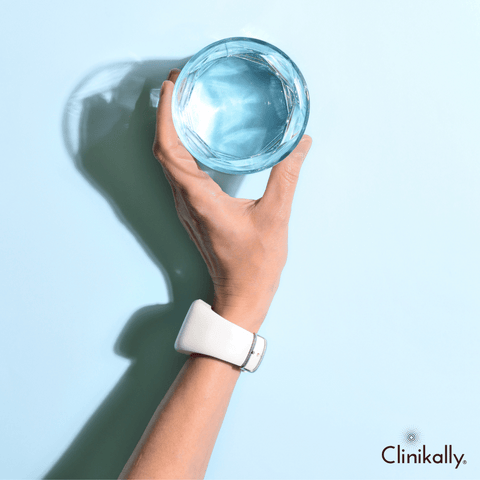
Hydration is essential for preserving hair health. Proper hydration is not only important for your general health, but it also has a direct impact on the condition and appearance of your hair. Here's how hydration affects hair health, including scalp moisture, hair texture, hair growth, hair breakage prevention, dry scalp prevention, and hair shine and lustre. You can support healthy, strong, and well-nourished hair by keeping sufficient hydration both inside and externally. This is a straightforward yet powerful method for promoting hair health and overall well-being.
Consult a dermatologist to prevent hair fall

Self-treatment is as good as shooting an arrow in the sky when it comes to hair fall. You must see an experienced dermatologist who can make a proper diagnosis of your issue and suggest the best way forward. You can consult dermatologists online on Clinikally and get effective, safe, and personalised treatment plans to treat hair fall in men and women. This works because effective hair fall treatment plans should be targeted at the root cause and based on a person's skin/scalp type.
Here are some of the reasons why you should see a dermatologist:
-
Accurate Diagnosis: Dermatologists can determine the root cause of your hair loss. A dermatologist can provide a precise diagnosis based on a thorough evaluation, whether it is androgenetic alopecia (genetic hair loss), alopecia areata, telogen effluvium, or another condition.
-
Tailored Treatment Plans: Once the cause of your hair loss has been determined, a dermatologist can create a customised treatment plan for you. This plan could include changes to one's lifestyle, dietary recommendations, prescription medications, or procedures such as hair transplants.
-
Access to Effective Medications: Dermatologists can prescribe medications that have been shown to be effective in reducing hair loss and promoting hair growth. Minoxidil, finasteride, and other treatments tailored to your specific condition may be among them.
-
Monitoring Progress: Dermatologists can keep track of your progress and make adjustments as needed throughout your treatment. They can determine whether your current treatment is effective and, if not, recommend alternatives.
-
Advice on Hair Care: Dermatologists can advise on hair care practises that promote healthy hair and prevent further loss. They can advise on the best shampoo and conditioner to use, as well as styling techniques to avoid hair damage.
-
Scalp Conditions: Dermatologists can diagnose and treat scalp conditions such as dandruff, psoriasis, and seborrheic dermatitis, all of which can contribute to hair loss.
-
Determination of Underlying Medical Conditions: In certain cases, autoimmune diseases or thyroid issues may present as symptoms of hair loss. A dermatologist can recognise these possible health issues and suggest that a suitable specialist conduct additional testing or provide treatment.
-
Knowledge of Hair Restoration Procedures: Dermatologists can provide knowledgeable advice on hair restoration procedures, including microneedling, laser therapy, hair transplants, and platelet-rich plasma (PRP) therapy.
If you are concerned about hair loss and its impact on your health, make an appointment with a dermatologist right away. They can assist you in determining the most effective and appropriate course of action to address your specific condition, as well as collaborate with you to prevent further hair loss and promote hair regrowth.





